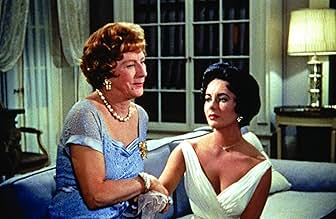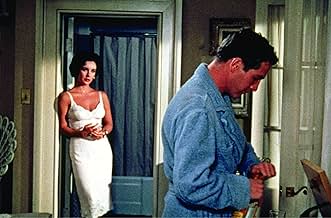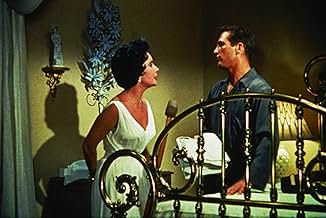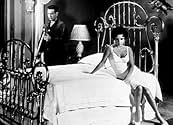Brick, ein alkoholkranker Ex-Footballspieler, trinkt den ganzen Tag und lehnt die Zuneigung seiner Frau Maggie ab. Die Wiedervereinigung mit seinem Vater, Big Daddy, der an Krebs stirbt, füh... Alles lesenBrick, ein alkoholkranker Ex-Footballspieler, trinkt den ganzen Tag und lehnt die Zuneigung seiner Frau Maggie ab. Die Wiedervereinigung mit seinem Vater, Big Daddy, der an Krebs stirbt, führt zu einer Vielzahl an Erinnerungen und Enthüllungen.Brick, ein alkoholkranker Ex-Footballspieler, trinkt den ganzen Tag und lehnt die Zuneigung seiner Frau Maggie ab. Die Wiedervereinigung mit seinem Vater, Big Daddy, der an Krebs stirbt, führt zu einer Vielzahl an Erinnerungen und Enthüllungen.
- Regie
- Drehbuch
- Hauptbesetzung
- Für 6 Oscars nominiert
- 3 Gewinne & 16 Nominierungen insgesamt
- Sookey
- (Nicht genannt)
- Boy
- (Nicht genannt)
- Buster
- (Nicht genannt)
- Child
- (Nicht genannt)
- Dixie
- (Nicht genannt)
- Pollitt Groom
- (Nicht genannt)
- Party Guest
- (Nicht genannt)
- Trixie
- (Nicht genannt)
- Sonny
- (Nicht genannt)
- Lacey
- (Nicht genannt)
Empfohlene Bewertungen
The casting is brilliant:
Tennessee Williams's Big Daddy was indeed big - larger than life, domineering, insensitive, self-absorbed. Burl Ives's Big Daddy is larger than life, insensitive, domineering, self-absorbed. Ives is "on" every moment. And every moment is true.
Paul Newman's Brick, is as afraid of life as Big Daddy is in love with it. Yet, in his way, he's a chip off the old block - self-absorbed, insensitive.
And domineering or, as Big Daddy and Maggie would have it, masterful, ready to take charge -
if he could just get over himself.
I confess, I don't care for Elizabeth Taylor as an actress, but she is so right for the part, that I can't think of anyone else to fill it. Anyway, who else has eyes that could compete with Newman's?
Judith Anderson plays the typical Williams matron, living in her house of delusions. She's Big Daddy's tormented, desperately lonely, unloved partner, who towards the end wins Big Daddy with her nobility and devotion.
The under-appreciated Jack Carter has the unenviable role of Brick's pliant, conformist brother, Gooper, decent at heart but worn out after years of jumping through Big Daddy's hoops and still winding up on the short end, with a house full of brats, bred at Big Daddy's presumed bidding and delivered by a scheming, ambitious weasel of a wife. Gooper the only character I have a little trouble with, because his climactic speech, as rendered by Carter, is so heartfelt, that we are aggrieved with him at the injustice of Big Daddy's favoritism for the no-account but aesthetically more pleasing Brick.
Perhaps an even more unenviable role is that of Gooper's wife, played to perfection by Madeleine Sherwood. Anyone who has grown up in the South has known "Sister Woman". I can assure those who haven't, that this character is not a stereotype or caricature.
There are a few quibbles. One character, the family doctor, though played well by Larry Gates, has a dramatic function that's about as useful as the referee in a pro wrestling match, but not nearly as decorative. I guess he's included to provide plot information, but I think it could have been provided just as well without him. I was also put off by the contrived thunder claps at dramatic moments. Then, there were some continuity problems, such as different facial expression when shot angles were changed and Gooper's too many "Shut ups" to Sister Woman.
If, as another reviewer has said, Tennessee Williams hated this film, then it couldn't have been because it was untrue to his work. If he disliked the changes and omissions, he should blame '50s prudishness, not the film, for dictating, say, the suppression of Brick's homosexuality.
Williams wrote about lies and delusions, the good ones and bad ones. Well, that's what Cat on a Hot Tin Roof and Streetcar Named Desire and Glass Menagerie were all about. Tennessee Williams's stories about the South and its culture of delusion are not just rebukes of Southern hypocrisy and bloodymindedness but paeans to the gentle and genteel refuge which delusion provides. As Maggie "The Cat" says, "Truth, truth - everybody keeps hollerin' about the truth. Well, the truth is as dirty as lies."
Finally, I think it was brilliant of Richard Brooks to insist on color, for Williams's stuff is talky, and with the drabness of a typical Williams set, this can be a bit oppressive. With color, and the wonderful animation Brooks instills in all the characters, his Cat contains not a dull moment. If Brooks has given us something at odds with what Williams intended, I think he has given us something just as fine.
Three of the greatest cinematic performances placed on film.
What makes the play so unique is this. Whereas directors tend to stage what they visualise in their heads when there are no stage directions to show exactly what the playwrights intend, Williams is very specific what he wants throughout. His characterisations are broad and his descriptions of everything down to the bed, which is very symbolic, are detailed. The film, like I said, is toned down, but it still retains the sizzle, wit and intensity of the play with consummate ease.
The screenplay is very witty, emotional and funny even. The direction is very good too, and respects Williams's style. The film for its time looks lovely with lovingly designed costumes and skillful cinematography. The music is great, and the editing is crisp.
Out of the performances, all of which were stellar in what is really an ensemble piece, Burl Ives stands out especially in a towering spot-on portrayal of the domineering patriarch Big Daddy, and managed to stay true to his character. Paul Newman is splendid as Brick, giving a performance of quiet intensity and broodiness. While she slightly overdid the Daddy Dawling routine, Elizabeth Taylor is deliciously catty and sexy as Maggie, and her and Newman's chemistry was evident throughout. While maybe not quite right in terms of build, Judith Anderson the brilliant actress she was is wholly convincing as Big Mamma. While loud and coarse, she is also sympathetic. Jack Carson plays Gooper well too, Madeleine Sherwood was a tad annoying as Mae, then again I never liked Mae that much in the play anyway.
There are many standout scenes, but the one that stood out for me was the scene in the rain with Big Daddy and Brick. Thanks to the contrasting personalities of the two characters and the powerful acting of Ives and Newman, it is one of the most powerful scenes in any film. It makes me wonder why Ives was so overlooked at the Academy Awards really. The final confrontation was also a highlight. All in all, Cat on a Hot Tin Roof has its minor flaws, but it is impeccably acted, atmospheric and very steamy. 9/10 Bethany Cox
Wusstest du schon
- WissenswertesDespite being really affected by her husband Mike Todd's death, Elizabeth Taylor resumed her job in a very professional way, without any delay on the set. Everyone was astonished by her determination.
- PatzerAfter Brick tries to drive away and gets stuck, Maggie goes out to him and helps him into the house through the pouring rain. Her hair is soaking wet, but the next time she is seen, it's perfectly dry and styled.
- Zitate
Harvey 'Big Daddy' Pollitt: I've got the guts to die. What I want to know is, have you got the guts to live?
- VerbindungenEdited into Hollywood: The Dream Factory (1972)
Top-Auswahl
Details
- Erscheinungsdatum
- Herkunftsland
- Sprache
- Auch bekannt als
- Un gato sobre el tejado caliente
- Drehorte
- Metro-Goldwyn-Mayer Studios - 10202 W. Washington Blvd., Culver City, Kalifornien, USA(studio: made in Hollywood, U.S.A. by)
- Produktionsfirma
- Weitere beteiligte Unternehmen bei IMDbPro anzeigen
Box Office
- Budget
- 3.000.000 $ (geschätzt)
- Weltweiter Bruttoertrag
- 1.872 $
- Laufzeit1 Stunde 48 Minuten
- Farbe
- Seitenverhältnis
- 1.85 : 1
Zu dieser Seite beitragen

































